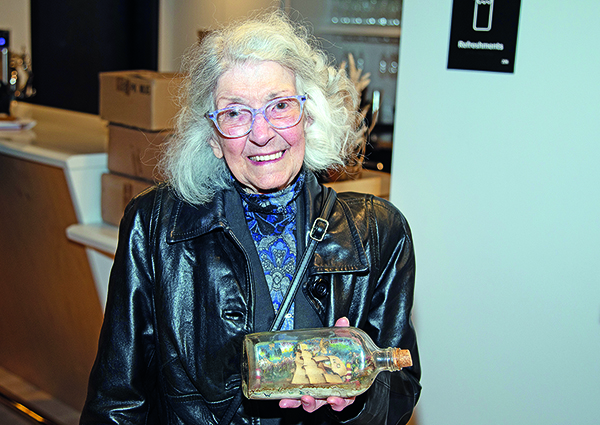|
This page was exported from The Auroran
[ http://www.newspapers-online.com/auroran ] Export date: Mon Feb 16 20:20:15 2026 / +0000 GMT |
Aurora “Farmerette” has blast from the past at film screening Joan Hill Tovey moved to Aurora in 1936 when she was just seven years old. At the time, it was a town of just 3,000 people, and she lived in the same house at 88 Wellington Street, until she married at 21. Those are the broad strokes – in between, she was one of tens of thousands of Ontario girls who had quite an adventure as Canada was getting back on its collective feet following the privations of the Second World War. Now 96, she returned to Aurora this month from Peterborough to see that story unfold at Aurora Town Square. On November 12, the Aurora Film Circuit came together with the Town of Aurora and historian Christopher Watts to host a screening of We Lend a Hand: The Forgotten Story of Ontario's Farmerettes. The documentary charts the story of no less than 40,000 teenage girls who volunteered on Canadian farms to aid the war effort – both during the war itself and the national recovery. The Farmerettes were part of the Ontario Farm Service Force that operated between 1941 and 1952, across the Province and into parts of Quebec. “With no prior farming experience, their hardships were tremendous,” say filmmakers. “For long months they worked under relentless weather conditions and schedules. Yet they single-handedly managed to produce hundreds of thousands of tons of food that were shipped off to the frontlines to feed starving European populations and even prisoners of war.” The event was also attended by director Colin Field and producer Bonnie Sitter who shared why the story of Ontario's Farmerettes struck such a chord with them. “I grew up with a father who loved to farm,” said Sitter. “We always had an orchard and a huge garden and I remember fondly being [with him] and learning how to do grafting and budding on trees for other orchard growers and we always had a job: go get the peas and get them shelled, pick the beans, dig the potatoes, pull the little potato bugs… I'm hoping that, for people that didn't have the opportunities that I had as a child, it will impact them and they'll look at the effort it takes to produce food. “First you have to have the land, you prepare it, you buy the seeds, you sow the seeds, and so many steps, and then you hope that the weather cooperates and you actually get a crop. Nothing happens in our world that people are not fed. Getting food is number one, and I think our society, to a large extent, is forgotten because you pick up the phone and you ask somebody to bring the food to you these days.” One such person who didn't have the opportunities Sitter had as a child was Field himself. “I grew up in Willowdale, so it was quite educational for me hearing 80 years later how strong the memories were for these [women],” he said. “Now I've got old bones and muscles and everything. I can't imagine picking one asparagus, let alone eight hours a day for the whole season. As we were down in the Niagara Region filming, it was some pretty hot days and we could barely be there in the fields, let alone on the second floor of a barn where they were sleeping before air conditioning had been invented. Just the reality of what that was like and what it's still like in many places in the world. The appreciation for how much goes into…and that's just to plant and harvest, let alone everything that happens after that.” Director and producer weren't alone in wanting the documentary to serve as an inspiration for the up-and-coming generation to learn more about agriculture and where our food comes from, with several members of the audience suggesting the documentary should be standard viewing for students, particularly in November as so many minds are turned to Remembrance and war experiences both abroad and on the home front. “I think that program (the Farmerettes) would be so worthwhile if every high school student had to spend a year on the farm,” said Sitter. “I think a lot of learning would happen and a lot of attitudes would change.” For more on We Lend a Hand: The Forgotten Story of Ontario's Farmerettes, visit welendahand.ca. By Brock Weir |
| Excerpt: We Lend a Hand: The Forgotten Story of Ontario’s Farmerettes hosted by Film Circuit, Town, Historian |
|
Post date: 2025-11-27 13:30:05 Post date GMT: 2025-11-27 18:30:05 Post modified date: 2025-11-27 13:30:19 Post modified date GMT: 2025-11-27 18:30:19 |
| Powered by [ Universal Post Manager ] plugin. HTML saving format developed by gVectors Team www.gVectors.com |